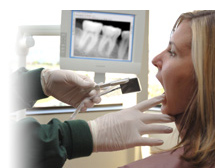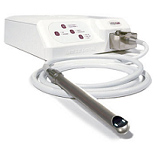ServicesWe are pleased to offer the following services and technologies to our patients: DENTAL IMPLANTSA dental implant is an ideal tooth restoration for people who are missing one or more teeth as a result of injury, periodontal disease, or any other reason. A dental implant is a metal post that a periodontist or oral surgeon surgically positions into the jaw. Once in place and bone surrounding the implant has had time to heal, a replacement tooth is attached to the post. While implants are typically more expensive than other methods of tooth replacement, they provide superior benefits. Implants are stronger than natural teeth and generally last 10-20 years. They are also a more favorable approach than bridgework since they do not depend on neighboring teeth for support. To receive implants, you need to have healthy gums and adequate bone to support the implant. You must also be committed to excellent oral hygiene and regular dental visits as these are critical to the long-term success of dental implants. Back to topPERIODONTICSConnective Tissue Graft Guided Tissue Regeneration Apicoectomy Back to top ORAL HYGIENE CAREMaintaining good oral hygiene is one of the most important things you can do for your teeth and gums. Healthy teeth not only enable you to look and feel good, they make it possible to eat and speak properly. Good oral health is important to your overall well-being. Daily preventive care, including proper brushing and flossing, will help stop problems before they develop. In between regular visits to the dentist, there are simple steps that each of us can take to greatly decrease the risk of developing tooth decay, gum disease and other dental problems. These include: 
The following are indications of good oral hygiene:
DENTAL CLEANINGA dental cleaning is a professional cleaning you receive from a dentist or dental hygienist. Most dental cleanings take approximately 45 minutes. Cleanings should be performed every six months to prevent excessive plaque buildup. Plaque left untreated can lead to unhealthy gums and tooth decay. During your routine cleaning we will remove excess plaque and polish your teeth. Back to top
TOOTH EXTRACTIONSGood oral hygiene should always be practiced since the loss of a single tooth can have major impact upon your oral health and appearance. Although dentists will use every measure to prevent tooth loss, there are still sometimes necessary occasions when a tooth may need to be extracted. A tooth may need to be extracted for the following reasons:
After careful examination and treatment, the dentist may advise you to have a tooth extracted. Before a tooth is removed, the dentist will take an x-ray in order to understand the shape and position of the tooth and surrounding bone. Based on the degree of difficulty, we may refer you to a specialized oral surgeon. For a simple extraction, we will first apply a local anesthetic to prevent pain and discomfort. The tooth will be loosened with a tool called an elevator and then removed with dental forceps. Once the procedure is complete, the area may be closed with one or two stitches. We will then provide you with care instructions to alleviate discomfort and ensure proper healing. Back to topTMJ TREATMENTSTMJ stands for temporal-mandibular joint. Temporal, as in temple area of skull; mandibular as in mandible, or lower jaw; joint as in where the head and jaw meet. Problems in this joint may be caused by a misalignment of the teeth, trauma, or excess muscle tension. Cartilage buffers the two bones and five muscles that meet in this area, but any problems in this area can create quite a bit of pain and biting difficulties. Symptoms of TMJ include:
Dental treatments for the condition can include replacing missing teeth, moving teeth, adjusting the bite and filling gaps between teeth. There is no one solution that is right for all cases. Occasionally a plastic mouthpiece is used to prevent clenching or grinding that is contributing to the problem. If untreated and in severe cases, surgery may be required to repair a badly damaged joint. Back to topNON-SURGICAL GUM TREATMENTThe gums, ligaments, and bone around the teeth form the foundation for teeth. All structures are also referred to as the periodontium. When the periodontium is not healthy, it jeopardizes the teeth just as a bad foundation would threaten the stability of a house. Signs of unhealthy periodontium include: gums that are red and bleed easily, persistent bad breath, gums that are pulled away from the tooth, loose teeth, and changes in the position or bite of the teeth. With proper gum treatments, it may be possible to return gum tissue to a healthy state. If you're having a problem, come in and see us so we may treat it right away. The treatment usually involves a deep cleaning or root planing done under a local anesthetic, along with local antibiotic agents. It is important to have gum problems checked promptly, as gum disease left alone may eventually need treatment through surgery or extraction. Back to top
NIGHTGUARDS AND MOUTHGUARDSCustom designed mouthguards and nightguards are made of flexible plastic and molded to fit the shape of your teeth. Mouthguards are recommended to protect the jaw and teeth during physical activity and sports such as boxing, football, basketball, or other activities where your mouth maybe hit. Guards also protect the soft tissues of your tongue, lips and cheek lining. Nightguards are recommended for patients who clench or grind their teeth at night as a way to protect their teeth and bite. If you have decided a guard is right for you, we will take an impression of your teeth which will then be sent to a lab to make a custom fit guard. In most cases you can choose from a variety of colors and styles. On average, guards last between 3 and 10 years. Back to topIn order to provide nothing but the best to our patients, our office uses state-of-the-art technologies in all our procedures. These new technologies allow us to treat dental cases with extreme precision, detect dental concerns at early stages, and provide stunning and customized restorations. When you visit our office you can be confident that you are receiving on the finest and most advanced in dental care. We proudly offer and use the following advanced equipment:
X-RAYS AND DIGITAL X-RAYSX-rays are a focused beam of x-ray particles passed through bone which produce an image on special film, showing the structure through which it passed. This provides the familiar black and white images doctors and dentists use to diagnose problems and disease. Without an x-ray of the whole tooth and supporting bone and gum tissues, there would be no way to detect infection or pathology that requires attention. In our office we use digital radiography which allows us to take x-rays using up to 90% less radiation than conventional film x-rays. Using this technology, we are able to take an x-ray of your mouth by using a small sensor which records the image of your teeth and sends it to a computer. The result is a highly detailed image of your mouth that can easily be enhanced to better diagnose dental concerns and determine the very best treatment for each case. Back to top
INTRAORAL IMAGINGWe use small cameras about the size of a pen, called intraoral cameras, to help clearly see the condition of your teeth and gums. With this advanced technology we can zoom in on small diseased areas, cracks, chips and worn metal fillings with extreme precision. The full-color images taken with the intraoral camera are sent to a computer screen so we can clearly see and diagnose dental problems much earlier than with traditional dental technology. Because images are displayed on our screens, patients will also be able to see areas being worked on and are able to gain a better understanding of dental procedures being performed. Back to topDIGITAL IMAGING SOFTWAREWe use digital imaging software in our office, which allows us to take a digital picture of you and use our imaging system to predict how a particular treatment or cosmetic procedure would change the appearance of your teeth. This software is beneficial for patients who are considering cosmetic procedures but are not sure if they're ready for dramatic changes. Digital imaging also allows us to document your dental case and procedures very well.We take digital images of your face, teeth and smile to provide us with a permanent dental record and to provide a visual documentation of treatment. Back to topELECTRONIC CLAIM PROCESSINGOur office utilizes electronic claims processing. This means that rather than sending your dental claim through the mail, it is sent electronically to your insurance company with the click of the button. By filing your claim electronically, information is submitted more efficiently and with fewer errors.This benefits our patients because the turn around time on claims is faster and fewer claims are returned or denied. We are happy to submit your dental claims to your insurance company on your behalf. Back to top |
| 701 N Hermitage Rd Suite 1 • Hermitage, PA 16148 ph. (724) 981-1401 • fax. (724) 981-3517 |